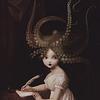Take a photo of a barcode or cover
challenging
informative
reflective
slow-paced
challenging
dark
informative
reflective
Fear and foreboding made deeply intellectual. And even more chilling. Reading this made me want to go back to the many gothic tales referenced and see them anew in the context of a newly terror-filled world order.
informative
medium-paced
So much fun. I love gothic fiction and it was endlessly interesting to learn more about its origins and development. Personally, I would have liked an essay or two on contemporary gothic books (the contemporary section focused almost entirely on films with a little bit about video games). I’d also love a follow up to this, which was published in 2008, about all the gothic fiction that’s been published since then.
challenging
informative
slow-paced
Leitura para pesquisa.
Antologia de artigos sobre o gótico. Como a maior parte dos livros do tipo, tem muitos altos e baixos, mas é o tipo essencial para quem estuda o gênero.
Antologia de artigos sobre o gótico. Como a maior parte dos livros do tipo, tem muitos altos e baixos, mas é o tipo essencial para quem estuda o gênero.
informative
medium-paced
Relatively informative as a resource, with some interesting ideas presented (albeit not all ones I necessarily agree with). I think this would be a good entryway for someone who enjoys Gothic fiction but doesn’t know the history of it. As an aside, a majority of the content warnings I’ve tagged for this are things discussed, not necessarily perpetuated, in the work.
Graphic: Incest, Racism, Sexual violence, Slavery, Xenophobia, Religious bigotry, Murder, Schizophrenia/Psychosis
Moderate: Confinement, Genocide, Homophobia, Misogyny, Antisemitism, Lesbophobia, Cultural appropriation, Abandonment, Colonisation, Classism
A majority of the content warnings are things discussed, not necessarily perpetuated; that being said there are definitely some things that are the authors dropping the ball (referring to Romani characters as the G slur repeatedly being one example of this).
So far, here is what I think:
This book > Andrew Smith's Gothic Literature > Fred Botting's Gothic
[Yes, I seem to be heading towards a ridiculous spree of reading every single Gothic lit companion book ever written and ranking them arbitrarily. No, I didn't intend to do this.]
The Cambridge Companion to Gothic Fiction is a dense book, with each chapter written by a different scholar. Some chapters, like the introductory chapter that serves to familiarize the reader with the complex history and evolution of Gothic literature, is rather procedural. On the other hand, there are chapters like the ones written by David Punter, Kelly Hurley and Fred Botting¹, which tend to delve into theoretical aspects of Gothic literature, from historical analysis to psychoanalysis and post-modern readings. The structure of the book easily permits the reader to choose whether they want to read the entire book or not, and it is possible to pick specific chapters to study without needing to read the rest. It is well-written, well-researched and I recommend it.
¹ The final chapter, written by Fred Botting, is my favorite in the book. It deals with post-modern incarnations of Gothic, and in my opinion, everything, from the prose and tone to the theory is leaps and bounds more fascinating than Botting's own companion book to Gothic literature.
This book > Andrew Smith's Gothic Literature > Fred Botting's Gothic
[Yes, I seem to be heading towards a ridiculous spree of reading every single Gothic lit companion book ever written and ranking them arbitrarily. No, I didn't intend to do this.]
The Cambridge Companion to Gothic Fiction is a dense book, with each chapter written by a different scholar. Some chapters, like the introductory chapter that serves to familiarize the reader with the complex history and evolution of Gothic literature, is rather procedural. On the other hand, there are chapters like the ones written by David Punter, Kelly Hurley and Fred Botting¹, which tend to delve into theoretical aspects of Gothic literature, from historical analysis to psychoanalysis and post-modern readings. The structure of the book easily permits the reader to choose whether they want to read the entire book or not, and it is possible to pick specific chapters to study without needing to read the rest. It is well-written, well-researched and I recommend it.
¹ The final chapter, written by Fred Botting, is my favorite in the book. It deals with post-modern incarnations of Gothic, and in my opinion, everything, from the prose and tone to the theory is leaps and bounds more fascinating than Botting's own companion book to Gothic literature.
informative
slow-paced









